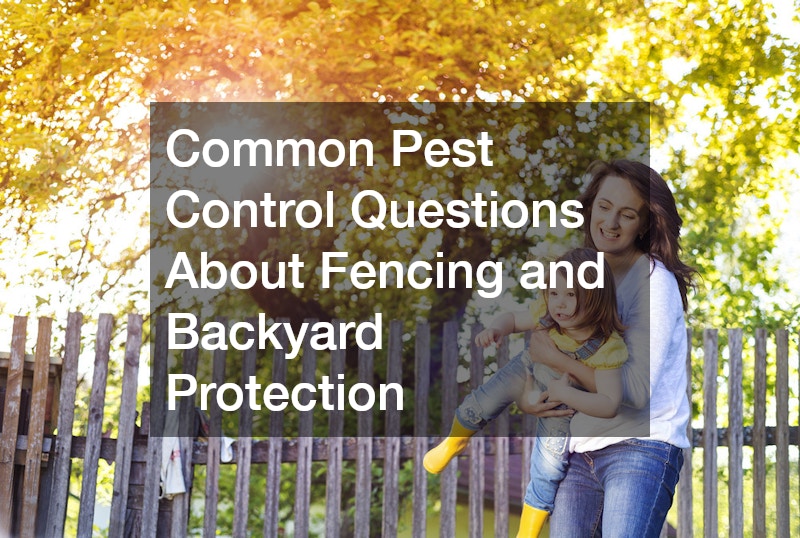When it comes to pest control, many homeowners overlook the role that fencing can play in keeping unwanted visitors at bay. Fences not only provide security and privacy but can also act as a deterrent to pests looking to invade your property. In this article, we will explore different pest control questions and how different types of fencing can help with pest control, the importance of proper installation and maintenance, and eco-friendly options for keeping pests away.
How Does a Fence Help With Pest Control?
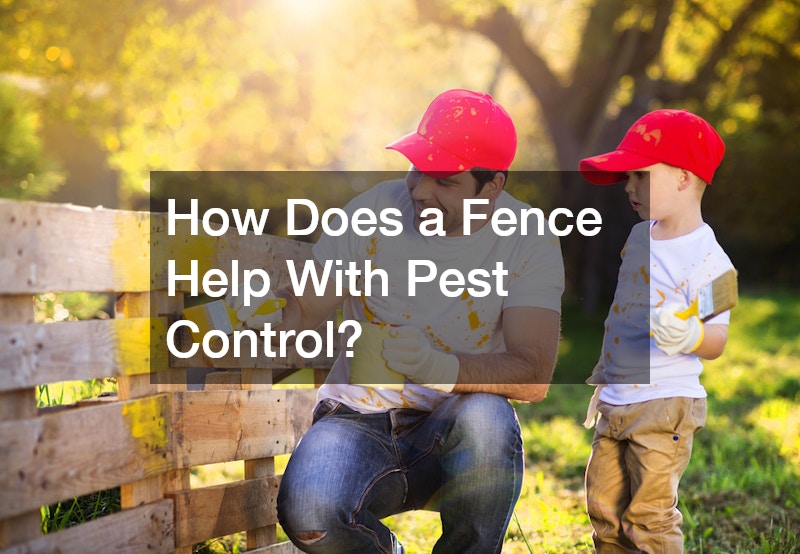
As this is one of many pest control questions, one of the main ways that a fence can assist with pest control is by creating a physical barrier that prevents pests from entering your property. By working with local fence contractors, you can install a fence that is specifically designed to keep pests out. Additionally, fences can limit the areas that pests can access, making it easier to monitor and control infestations.
In addition to keeping pests out, fences can also help contain pets and prevent them from attracting pests into your yard. Properly installed and maintained fences can act as a first line of defense against common pests, such as rodents, raccoons, and deer, that may cause damage to your property.
It is important to regularly inspect your fence for any signs of damage that may allow pests to enter. By addressing any issues promptly and enlisting the help of pest control experts when needed, you can ensure that your fence continues to serve as an effective barrier against unwanted intruders.
What Types of Fencing Are Most Effective Against Common Pests?
When it comes to keeping pests out, chain link fences are often considered one of the most effective options. The open design of chain link fences makes it difficult for pests to climb or burrow under them, reducing the chances of a pest infestation. Additionally, the material used in chain link fences is durable and long-lasting, providing a reliable barrier against pests.
Other types of fencing that are effective against common pests include vinyl and aluminum fences. These materials are resistant to pests and corrosion, making them ideal for homeowners looking for low-maintenance options. By working with a fence company that specializes in pest control, you can choose the best type of fencing for your property based on your specific needs by understanding the answers to these pest control questions.
In addition to the material and design of the fence, proper installation is key to ensuring its effectiveness against pests. Fence installation should be done by professionals to ensure that the fence is secure and will not allow pests to enter through gaps or weak spots.
Can Fencing Prevent Insect Infestations?
While fences are effective at keeping out larger pests, such as rodents and deer, they may not be as effective at preventing insect infestations. Insects can easily find their way through small gaps in fences or through the soil underneath the fence. However, certain types of fencing, such as pool fences with smaller gaps, can help prevent insects from entering your yard.
To further prevent insect infestations, it is important to maintain a clean and well-kept yard. Removing standing water, trimming vegetation away from the fence, and keeping garbage containers sealed can all help reduce the likelihood of attracting insects to your property. If you suspect an insect infestation, contacting a pest control company to answer your pest control questions is recommended to address the issue promptly.
In some cases, using pest control products near the fence may be necessary to prevent insect infestations. However, it is important to use these products safely and according to manufacturer instructions to avoid harming the environment or pets.
How High Should My Fence Be to Keep Out Larger Pests?
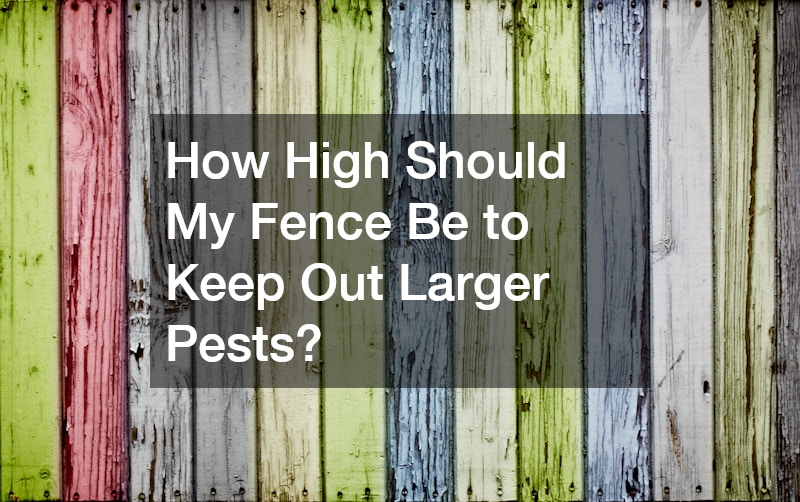
The height of your fence will depend on the types of pests you are trying to keep out. For larger pests, such as deer or raccoons, a fence that is at least 6 to 8 feet high is recommended. This height is often sufficient to prevent these animals from jumping or climbing over the fence and gaining access to your property.
When installing a fence to keep out larger pests, it is important to ensure that the fence is sturdy and securely installed. Fence installation service providers can help you determine the appropriate height and design for your fence based on the specific pests in your area. Regular maintenance and inspection of the fence will also help ensure its effectiveness in keeping out larger pests.
In addition to the height of the fence, adding deterrents such as motion-activated lights or noise devices can help discourage larger pests from approaching the fence. These additional measures can provide an extra layer of protection for your property.
Are There Gaps or Spaces in Fencing That Pests Can Exploit?
Even the most well-built fences can have gaps or spaces that pests can exploit to gain access to your property. Common areas where gaps can occur include around gates, at the bottom of the fence, or where the fence meets the ground. Regularly inspecting your fence for any signs of damage or gaps and addressing them promptly can help prevent pests from entering.
To minimize gaps in the fencing, it is important to choose a design that is solid and has minimal spaces between slats or panels. Additionally, ensuring that the fence is properly installed and maintained can help reduce the likelihood of gaps forming over time. If you notice any gaps in your fence, contacting a fence installation company for repairs or upgrades is recommended.
Pool fences, in particular, should be carefully designed and installed to prevent pests from gaining access to the pool area. Pool fences with self-closing and self-latching gates can help keep out pests while also providing a safety barrier for children and pets.
How Does Landscaping Near the Fence Impact Pest Control?
As this is one of many pest control questions, the landscaping near your fence can have a significant impact on pest control. Trees and shrubs planted close to the fence can provide pests with easy access to your property by acting as bridges over the fence. To prevent this, it is recommended to maintain a clear space between vegetation and the fence.
Additionally, overgrown plants and bushes near the fence can provide hiding spots for pests, making it easier for them to enter your property undetected. Regularly trimming vegetation and removing any debris or clutter near the fence can help reduce the risk of pest infestations. Working with a fence installation service provider can help you design a landscaping plan that complements your fence and minimizes pest attractants.
In some cases, certain plants can act as natural deterrents to pests and may be beneficial to include in your landscaping near the fence. Plants such as marigolds, lavender, and mint are known for their pest-repelling properties and can help keep pests at bay. By carefully selecting and maintaining your landscaping, you can further enhance the effectiveness of your fence in pest control.
Can Pest Control Products Be Safely Used Near Fencing?
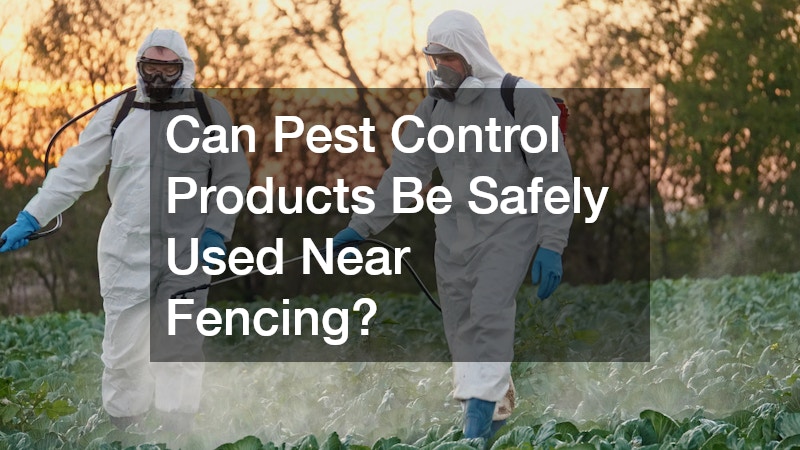
As this is one of many pest control questions, when using pest control products near fencing, it is important to take precautions to ensure the safety of pets, wildlife, and the environment. Before using any pest control products, carefully read and follow the instructions provided by the manufacturer. Keep in mind that certain products may be harmful if ingested by pets or wildlife.
To minimize the risk of exposure to pest control products, consider using natural or eco-friendly alternatives that are safer for the environment. These products are often made from natural ingredients and are less toxic than traditional chemical pesticides. Working with pest support experts can help you choose the most effective and environmentally friendly pest control options for your property.
If you are unsure about using pest control products near your fence, seek guidance from a pest control company. These professionals can assess your individual pest control needs and recommend safe and effective solutions that can be used near fencing without posing a risk to pets, wildlife, or the environment.
Does Electric or Wired Fencing Provide Better Pest Control?
As this is one of many pest control questions, electric or wired fencing can be effective at deterring pests from entering your property. These types of fences deliver a mild electric shock to pests that come into contact with them, providing a strong deterrent against intruders. While electric fencing can be more expensive to install, it is a highly effective option for controlling pests.
In addition to deterring pests, electric fencing can also be used to contain pets and livestock within a specific area. By creating a barrier that delivers a harmless shock, electric fencing can help keep pets and livestock safe while preventing them from wandering into areas where they may attract pests. Contacting pest control services that specialize in electric fencing can help you determine if this option is right for your property.
Before installing electric or wired fencing, it is important to check local regulations and ensure that proper safety measures are in place. Signs should be posted to alert visitors of the electrified fence, and precautions should be taken to prevent accidental shocks to humans or pets. Regular maintenance and inspection of the fence will also help ensure its continued effectiveness in pest control.
How Often Should I Inspect and Maintain My Fence for Pest Prevention?
Regular inspection and maintenance of your fence are essential for pest prevention. Ideally, you should inspect your fence at least once a month to check for any signs of damage, gaps, or other vulnerabilities that pests could exploit. Pay close attention to areas where the fence meets the ground, as pests are more likely to enter through these gaps.
During your inspections, look for signs of pest activity, such as droppings, chew marks, or nests near the fence. If you notice any signs of pests, contact a pest extermination company to assess the situation and recommend appropriate treatment. Addressing pest infestations promptly can help prevent further damage to your property.
In addition to regular inspections, it is important to maintain your fence by repairing any damage, replacing worn or broken materials, and keeping the fence clean and free of debris. By staying proactive about fence maintenance and pest prevention, you can ensure that your property remains pest-free and secure by knowing the answers to these pest control questions.
Are There Eco-Friendly Pest Control Options That Work With Fencing?
For homeowners looking for environmentally friendly pest control options, there are a variety of eco-friendly solutions that can be used in conjunction with fencing. Natural pest deterrents, such as essential oils, diatomaceous earth, and plant-based repellents, can help keep pests away without harming the environment or wildlife.
In addition to natural deterrents, integrating beneficial insects into your garden can help control pest populations without the use of harmful chemicals. Ladybugs, lacewings, and praying mantises are just a few examples of beneficial insects that can eat pest insects and help keep your garden pest-free. Fence companies that specialize in eco-friendly solutions can help you incorporate these options into your pest control plan.
By combining eco-friendly pest control methods with a well-built and properly maintained fence, you can create a sustainable and effective pest control strategy for your property by knowing the answers to these pest control questions. These methods not only help keep pests at bay but also promote a healthy and thriving ecosystem in your yard.
Can Fencing Help Protect Gardens and Pools From Pests?
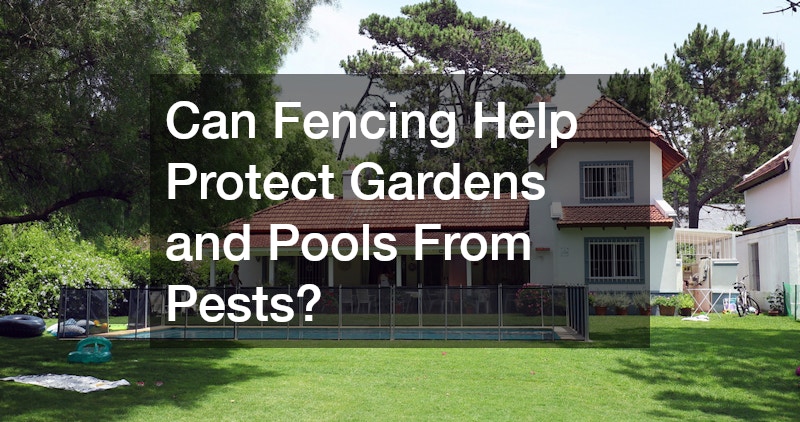
Gardens and pools are often targeted by pests looking for food, water, and shelter. Fencing can help protect these areas by creating a barrier that prevents pests from entering. By choosing a fence that is appropriate for the size and layout of your garden or pool, you can effectively keep out pests while also enhancing the aesthetics of your outdoor space by knowing the answers to these pest control questions.
Installing mesh or wire fencing around gardens can be particularly effective in keeping out smaller animals like rabbits, groundhogs, and even some insects. For pool areas, solid fencing with minimal gaps helps deter rodents, snakes, and larger wildlife that may be attracted to the water. It’s important to ensure the fence is properly secured at the base to prevent animals from burrowing or squeezing through.
Additionally, consider incorporating gates with self-closing and self-latching mechanisms to maintain security and reduce access points for pests. Regularly inspect these barriers for damage or wear, especially after storms or heavy use. Combining fencing with complementary pest deterrents—like motion-activated sprinklers, citronella plants, or natural repellents—can further protect your garden and pool from unwanted visitors while promoting a safer, cleaner outdoor environment.
Fences play a crucial role in pest control by acting as a physical barrier that deters pests from entering your property. By working with local fence contractors and employing proper installation and maintenance practices, you can create a pest-resistant environment that keeps your home and yard secure. From choosing the right type of fence to implementing eco-friendly pest control methods, there are various ways to enhance the effectiveness of your fence in keeping pests at bay by knowing the answers to these pest control questions.
